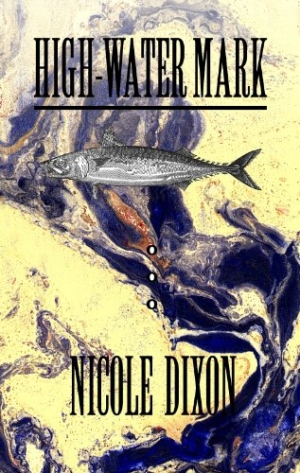High-Water Mark
- 2012 INDIES Winner
- Honorable Mention, Short Stories (Adult Fiction)
In this fine collection of stories, characters often stumble upon what they’re actually looking for amid the flotsam and jetsam left by the receding dreams and washed-up hopes of not only their own lives, but all those around them.
Winner of ForeWord’s quarterly contest for debut fiction authors, Nicole Dixon’s High-Water Mark takes on Alice Munro territory—not just in the geographical setting of Canada, but also in the thematic sense of secrets rattling around like something loose on a car. But with a little more kink. And more edge.
One of the pleasures of this first collection is the writing itself. People and landscape are made vivid, whether it’s a woman’s face described as “ruddy and slightly lined, like a February apple” or the end of a path opening “like the jaw of a beast, all waves and sky and rowdy wind.”
Another pleasure is the strong voice that comes through no matter who is narrating, from snarky teens to horny husbands. There is no sentimentality, just telling it like it is, as if the author is not going to baby the reader any more than her characters baby their students, parents, or offspring. In places like Refugee Cove, babies are an industry and adults are the children. Kids like Ainslee, who has a summer job in the gift shop at the Cape, sound like authorities before they’re even out of school: “The world doesn’t need any more people, so it picks at them like scabs and off they go.”
Sometimes the characters appear from one story to the next, helping to unify this collection. Other times, it’s the overlapping themes that tie one story to the next, e.g., mourning the life you thought you had; getting revenge on those who’ve hurt you; or losing direction and finding your way back.
In “Diving for Pearls,” a girl comes home pregnant after vagabonding her way around the world, “stupid in love” with a guy in Belize, but as trapped as the lobsters she helps her father catch. In “An Unkindness of Ravens,” a young couple struggles with jealousy, cooped up in a relationship that ends with an injured raven being released back into “the group, the family, being unkind.” In “Mona Says Fire, Fire, Fire,” a school teacher who’s grown tired of the chase, catch, and release of relationships comes close to snuffing out “the lick of flame” between her and her boyfriend instead of seeing it “crackle” like the northern lights.
In fact, like repeat tourists who come back each summer to Cape Breton “for the high, the shock,” the chance to touch the fire to remember it’s hot, the reader will also get a charge out of these stories. There is life here.
The author is an electronic resources librarian at Cape Breton University. Her stories have appeared in The New Quarterly and other literary journals.
Reviewed by
Trina Carter
Disclosure: This article is not an endorsement, but a review. The publisher of this book provided free copies of the book and paid a small fee to have their book reviewed by a professional reviewer. Foreword Reviews and Clarion Reviews make no guarantee that the publisher will receive a positive review. Foreword Magazine, Inc. is disclosing this in accordance with the Federal Trade Commission’s 16 CFR, Part 255.

